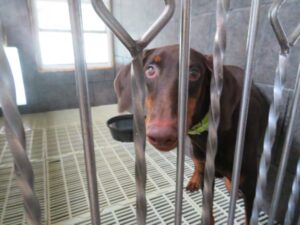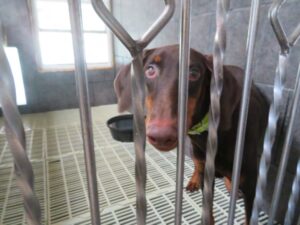In a rare move, Iowa regulators are imposing a significant fine against a dog breeder that federal officials have called one of the nation’s biggest repeat violators.
The Iowa Department of Agriculture and Land Stewardship is fining Wayne County breeder Daniel Gingerich $20,000 and suspending his Iowa license for 60 days, the department announced Monday. Gingerich does business as Maple Hill Puppies.
The state’s action coincides with federal action in civil court, where U.S. District Court Judge Stephanie Rose recently agreed to the U.S. Department of Agriculture’s request for a temporary restraining order against Gingerich due to numerous violations of the federal Animal Welfare Act.
The state’s action is based on the USDA’s findings and on Gingerich’s alleged “failure to meet standards of care” for the hundreds of dogs in his control in July.
Federal records indicate Gingerich has been operating kennels or breeding facilities in 10 different locations throughout Iowa, several of which are unlicensed. One unlicensed facility, where dogs allegedly went without water for three days, is in Redding, and others are in Lamoni and Cantril.
Gingerich’s main base of operations appears to be in Seymour, where he lived before moving to Ohio in May, according to court records. Although it’s not clear how many dogs Gingerich owns, the records suggest that at one time this year, he had at least 1,000 dogs and puppies on hand.
No criminal charges have been filed in the case. The Iowa Department of Agriculture and Land Stewardship says that in the past two years, it has issued only six administratively ordered penalties against state-licensed animal-welfare facilities.
Although state inspections of breeding facilities are supposed to be unannounced, IDALS records indicate that sometimes those visits are scheduled in advance with the owners.
In Gingerich’s case, IDALS says one of its inspectors received a call from Gingerich in July, during which he agreed to meet the inspector for a July 28 inspection of one of his two properties located in Seymour. When inspectors arrived there for “the previously agreed upon inspection,” Gingerich was not present, IDALS says, but he arrived 45 minutes later after being contacted by phone.
Although the site was operating without a state permit, there were 148 dogs on the premises, including some outside and some located inside a barn. Several dogs were exhibiting signs of heat stress and were panting and drooling, IDALS alleges. The heat index in the barn was measured at 112 degrees.
A dead, decaying puppy was found in the grass outside, and Gingerich was allegedly unable to provide inspectors with any vaccination or veterinary records for the 148 dogs.
The inspectors next went to Gingerich’s other Seymour facility, which has a state permit. Inspectors found 527 dogs there, including a poodle sitting in direct sunlight inside a small crate, and other dogs that appeared to be in immediate need of veterinary care. Several dogs have open, painful wounds on their heads. A dead puppy was found inside one of the kennels.
Some of the dogs at the site appeared to be showing signs of heat stress and were laying in their drinking water to keep cool. Dozens of puppies were housed in kennels with slat flooring, with gaps big enough for their legs to fall through.
Gingerich allegedly denied there were any other dogs on the property but when inspectors pressed, he admitted there were more dogs inside “the old horse barn” on the property. When inspectors went inside the barn, they found 27 dogs there confined to “excessively dirty horse stalls” with no water present in their enclosures. The heat index inside the barn was measured at over 110 degrees.
Two more dead dogs, each about 15 weeks of age, were found inside the barn. A golden retriever had to be euthanized on the spot. Gingerich later told investigators he had to euthanize seven additional dogs.
After the two inspections, the USDA gave Gingerich special permission to begin selling the dogs. According to IDALS, 53 dogs were given to another breeder, and roughly 250 dogs were moved to a Missouri facility to be auctioned.
By Aug. 11, there were only 307 dogs remaining at the Seymour properties.
In an administrative order accompanying the $20,000 civil penalty, IDALS alleges that Gingerich failed to meet the minimum standard of care expected to breeders and failed to have the required license or permit for one of his facilities.
According to the USDA, in the two years since it issued Gingerich a license to breed and sell dogs in Iowa, he has amassed more than 100 citations for violations of the act.
Dr. Heather Cole, a supervisory veterinary medical officer for a division of the USDA, stated in a recent declaration to the court that she has “never encountered a licensee who has this high of a level of chronic and repeat noncompliance across every category of Animal Welfare Act requirements.”
The court-issued restraining order requires Gingerich to provide federal authorities with a list of every location at which he has any dogs intended for breeding or sale; to provide authorities with a complete animal inventory for each location; and to ensure that within two weeks every dog listed on the inventory receives a “complete physical examination from head to tail.”
The court stipulated that the veterinary care provided as a result of the order must be provided by someone other than Gingerich’s regular vet, Dr. William McClintock, or any of the other vets working at the Country Village Animal Clinic in Centerville.
Gingerich has not yet filed a response to the court action or the state’s administrative order.




